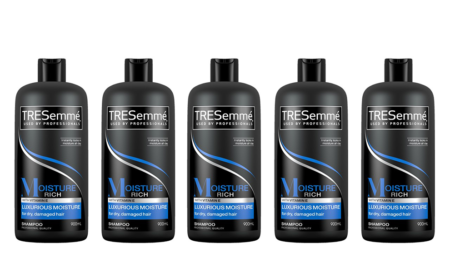Consumer goods company Unilever is to use a ‘detectable’ black pigment in plastic packaging for its TRESemmé and Lynx cosmetic product brands, to enable the material to be sorted for recycling in MRFs.
Unilever says it will phase in the use of the new polymer on its black High Density Polyethelyne (HDPE) bottles for packaging in the two brands this year – equating to a total of around 2,500 tonnes of the material.

The company says it will phase in the new technology on all black HDPE bottles for TRESemmé this year
Unilever has carried out trials in partnership with plastics recycling body Recoup and waste management firms Veolia, Suez and Viridor as well as the sorting specialist TOMRA to trial the feasibility of the detectable HDPE polymer.
This included trials at Viridor’s Rochester polymers facility as well as Veolia’s Southwark recycling facility.
Black plastics using a ‘carbon black’ pigment can be a problem for waste management firms when they are collected in mixed recycling loads, as they cannot be detected by Near-Infra-Read (NIR) sorting machines widely used in sorting facilities.
However, by using a detectable black pigment, the packaging will instead be able to be sorted alongside other coloured HDPE bottles, rather than ending up as a MRF residue, which would be treated via energy from waste or in landfill disposal.
Unilever has announced the development almost a year after having signed to the voluntary ‘Plastics Pact’, a government-backed pledge aimed at reducing “problematic or unnecessary“ single-use plastic packaging by 2025, as well as to ensure 100% of plastic packaging is recyclable by that date.
Sebastian Munden, general manager of Unilever UKI, said: “We’ve been working on a solution for black plastic for some time, and this move to using detectable black plastic in our TRESemmé and Lynx bottles means we will potentially be removing around 2,500 tonnes of plastic from the waste stream.
“For the UK & Ireland we want to significantly accelerate this and we’re proud our innovation will help us towards achieving our aim, as well as making a significant contribution towards the UK Plastics Pact targets. We’d like to thank our industry partners for their part in working with us to make this possible.”
Welcomed
The development was also welcomed by a number of the partners involved in the scheme. This included Richard Kirkman, chief technology and innovation officer, Veolia UK & Ireland, who said the company has already upgraded the technology at its MRFs.

Veolia’s MRF at Brigton Hollingdean
“We have deployed an innovative solution within the software and invested in our sorting technology at our flagship recycling facility in Southwark and this, together with Unilever modifying the pigment in the black dye for their HDPE packaging, enables it to be successfully detected.”Recycling is a chain of events from manufacturer, consumer to recycler and we need each part of the chain to make changes to have successful scalable results.
‘Committed’
Phil Piddington, managing director of the resources and waste firm Viridor’s said his company is committed to working with all sectors to achieve greater recyclability of products.
“Black plastic bottles were invisible to our machines but in collaboration with Unilever we have upgraded the technology to accept ‘detectable black’ – if a bottle is marked as ‘detectable’ then it can come to a Veolia MRF and will be recovered.”
Richard Kirkman
Veolia
“The collaboration with Unilever – which saw the HDPE bottles trialled at Rochester Polymers Recycling Facility – was an excellent example of how sectors could work together to help the UK achieve its circular economy ambitions,” Mr Piddington explained.
He added: “We are pleased to work with Unilever on a project which supports recycling efforts at the kerbside by offering closed loop recycling solutions, reducing the use of virgin plastic and giving the public increased confidence in recycling and reprocessing here in the UK.”
Stuart Hayward-Higham, Technical Development Director at Suez said: “We have welcomed the general reduction in the use of unnecessary black plastics placed on the market but recognise the responsible lead Unilever has taken in seeking to create a closed loop solution for their black plastic products, including the design and testing of detectable black plastic polymers.
“In collaborating, the value chain is starting to show what is possible. We look forward to continuing to work on this project to see how these materials can successfully be collected, sorted and recycled into new Unilever products within the existing or future mainstream waste management systems.”
The post Unilever to use ‘detectable’ black plastic in packaging appeared first on letsrecycle.com.
Source: letsrecycle.com Plastic



